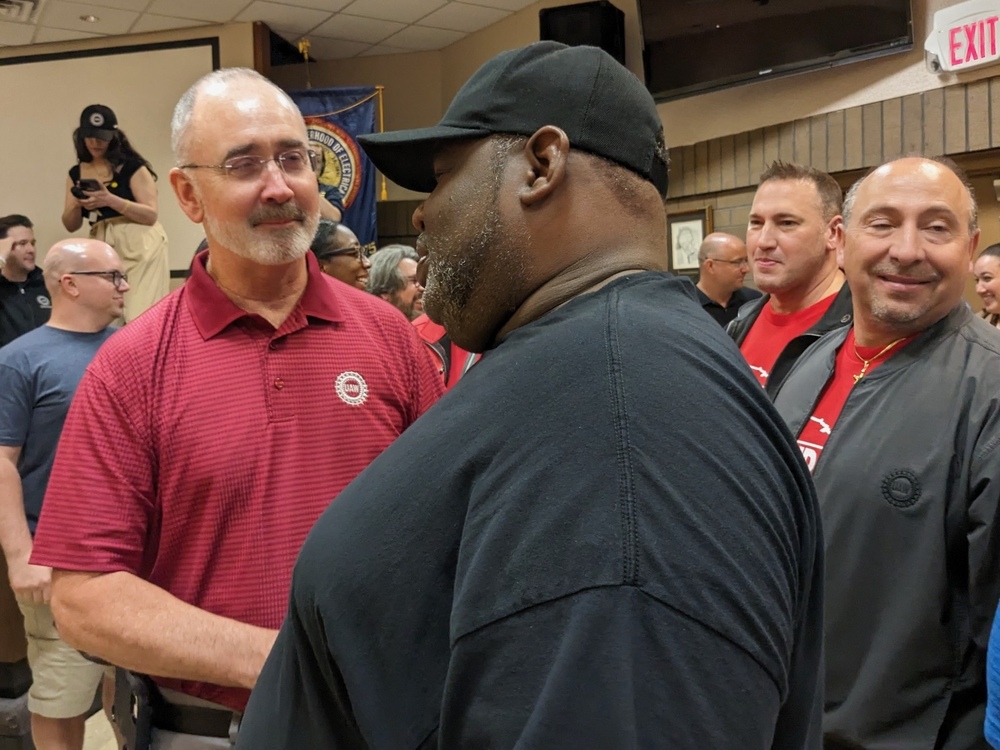
Workers at the Volkswagen plant in Chattanooga, Tenn., have voted overwhelmingly to join the United Auto Workers, setting a new trajectory for labor unions in the American South.
With 3,613 ballots counted, the final tally was 2,628 votes in favor of joining the UAW, and 985 votes against. Some 73% of workers voted in favor of unionizing.
The UAW pulled off the resounding victory after two prior defeats in a region deeply skeptical of unions and despite repeated warnings from state Republican leaders and the business community that unionizing would be a big mistake.
From early in the count, it was clear that the UAW had won many workers over. Yes votes quickly began outnumbering no votes by about 3 to 1, a lead that held throughout the night.

Quinton North, who assembles battery packs for the Volkswagen ID.4 electric SUV, voted no in the last union election at Volkswagen in 2019, swayed by pervasive anti-union messaging in that campaign.
This time, North voted yes, citing the leadership of UAW president Shawn Fain as a big reason.
"He's really showed what he is — he's for the workers," he said at a UAW-organized watch party in Chattanooga.

Addressing the watch party crowd after the tally was complete, Fain welcomed the Volkswagen workers into the UAW and thanked them for their perseverance.
"You all have just done the most important thing a working class person can do, and that's stand up," he said to loud cheering.
Some 4,300 hourly workers at the plant were eligible to vote this week. The union needed a simple majority of votes cast to win the election.
Noting voter turnout of 83.5%, the German automaker issued a short statement saying: "Volkswagen thanks its Chattanooga workers for voting in this election."
Chattanooga plant was previously a place of UAW defeat
All eyes were on the Volkswagen vote, given two previous defeats for the UAW's attempt to organize the same Chattanooga plant in 2014 and 2019. Similar efforts at several other auto manufacturing plants in the South have also failed over the years.
One of the key reasons is that these jobs have paid well compared to others in the region, and many workers haven't felt the need for union representation. In fact, over the years, Southern states lured foreign automakers with not just hundreds of millions of dollars in incentives but some assurance that the companies wouldn't have to deal with the UAW if they didn't want to.
The pitch worked. In the last three decades or so, around a dozen foreign auto plants have opened up, from Nissan and Toyota to Honda and Mercedes, among others. Collectively, they've created tens of thousands of jobs for the Southern economy.
Politicians warned jobs were in jeopardy
Republican leaders in the state had warned that those jobs could be lost should workers join the UAW.
"I believe it would be a big mistake for those workers to risk their future by giving up the freedom to decide it themselves and hand that over to a negotiator on their behalf," said Tennessee Gov. Bill Lee on a visit to Chattanooga earlier this month.
The UAW's focus on the South, backed by $40 million in spending, has drawn concern from other state politicians as well.
On Tuesday, Lee joined governors from Texas, South Carolina, Mississippi, Georgia and Alabama in a joint statement speaking out against the union drive.
"The reality is companies have a choice when it comes to where to invest and bring jobs and opportunity," the statement said. "Unionization would certainly put our states' jobs in jeopardy — in fact, in this year already, all of the UAW automakers have announced layoffs."
Tesla, which is not unionized, also announced major layoffs this week.
In a statement congratulating the Volkswagen workers on their "historic vote," President Biden took aim at the politicians.
"Let me be clear to the Republican governors that tried to undermine this vote: there is nothing to fear from American workers using their voice and their legal right to form a union if they so choose," he wrote.

It was the only VW plant in the world without worker representation
In a Q&A on its website, Volkswagen wrote: "We respect our employees' right to decide this important issue through a democratic process and to determine who should represent their interests."
Assembly worker Joshua Treece, who voted yes, said the company seemed pretty neutral as the election neared.
"The only negative stuff would have been from other employees that were against it," he says.
The Chattanooga plant produces Volkswagen's Atlas SUV and the ID.4, an electric SUV. Until now, it was the only Volkswagen plant worldwide without worker representation.
With the vote at Volkswagen now wrapped up, the union is turning its attention to the Mercedes-Benz plant in Vance, Ala., where a union election will begin May 13 for some 5,200 workers.







